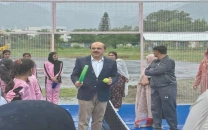Tribal women: Getting education under the Sword of Damocles
Govt urged to take concrete steps for women empowerment.

Tribal women have demanded that the government take concrete steps to ensure uniformity of law in the country, including the tribal areas.
The demand was made during a seminar on “Women Rights in Tribal Areas”, held by the Human Rights Commission of Pakistan (HRCP) at a local hotel on Friday.
(Read: ‘Women are still impure in the land of the pure’)
Noor Zia, who hails from Khyber Agency, said that the literacy rate in tribal areas was low due to security reasons and the lack of facilities in state-run schools.
She said that due to the fragile law and order situation, there are no teachers in the tribal belt, adding that there is also no university in the tribal areas.
According to official statistics, there were 35 government degree colleges in the Federally Administered Tribal Areas (Fata) in 2010. However, due to poor law and order, seven colleges have been shut down, while 200 primary schools remain closed.
According to a 2009-10 HRCP report, over 120,000 students, mostly female, were forced to leave their schools during the last few years, while the remaining female students in Fata were getting education under the Sword of Damocles.
The report said that approximately 80 hospitals were partially damaged by the militants and during the ensuing military operation in the tribal areas, adding that due to the prevailing situation, female doctors and medical staff have refused to work in Fata.
The report also said that the Department for Social Welfare and Development opened in the Fata Secretariat for the first time last year, while four schemes have been introduced in the tribal areas under various development programmes this year.
These include workshops for artificial human parts, the establishment of a community development centre in South Waziristan, the establishment of modern orphanages in Khyber Agency and South Waziristan, and the release of Rs9.5 million for community-based organisations.
However, these schemes do not provide a direct platform for women.
Participants said that women were unaware of their rights, adding that their rights were even violated in urban areas.
They said that different laws prevailed in different parts of the country, while the practice of swara (child marriage) was still common in the tribal belt.
The participants stressed on the need to spread education in every nook and corner of the country to bring awareness among women about their rights. They also urged women to raise their voices for their rights.
Published in The Express Tribune, September 24th, 2011.



















COMMENTS
Comments are moderated and generally will be posted if they are on-topic and not abusive.
For more information, please see our Comments FAQ